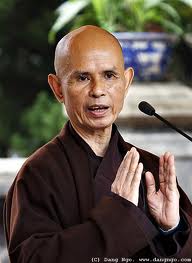 The Buddhist Channel reports that the recent expulsion of 379 monks and nuns from a Buddhist monastery in Northern Vietnam has sparked debate about the Vietnamese government’s testy relationship to Vietnamese Buddhism. Since Thich Nhat Hanh’s 2005 visit to the country—his first in nearly forty years—the monastic residents of Bat Nha Monastery, affiliated with Thich Nhat Hanh, have lived free of government interference. But after being harassed since June of this year by local government authorities—at which time electricity, water, and phone services to the monastery were cut off—the confrontation came to a head last week, when a reportedly government-backed mob violently drove the monks and nuns from Bat Nha. The ruling party, however, has not always been unfriendly to Buddhists. In a 2008 Tricycle article, Jared Roscoe reported that Thich Nhat Hanh’s 2005 return to Vietnam was denounced by the United Buddhist Church of Vietnam (UBCV) on the grounds that “the Vietnamese government would sell Thich Nhat Hanh’s visit to the international community as a tacit endorsement of the piecemeal reforms undertaken to show improvement in religious freedoms and human rights.” (The UBCV, an independent Buddhist organization, has been marginalized for decades under the government’s ban on independently practiced Buddhism.) So why are TNH’s followers now getting the boot? Reuters’ John Ruwitch comments:
The Buddhist Channel reports that the recent expulsion of 379 monks and nuns from a Buddhist monastery in Northern Vietnam has sparked debate about the Vietnamese government’s testy relationship to Vietnamese Buddhism. Since Thich Nhat Hanh’s 2005 visit to the country—his first in nearly forty years—the monastic residents of Bat Nha Monastery, affiliated with Thich Nhat Hanh, have lived free of government interference. But after being harassed since June of this year by local government authorities—at which time electricity, water, and phone services to the monastery were cut off—the confrontation came to a head last week, when a reportedly government-backed mob violently drove the monks and nuns from Bat Nha. The ruling party, however, has not always been unfriendly to Buddhists. In a 2008 Tricycle article, Jared Roscoe reported that Thich Nhat Hanh’s 2005 return to Vietnam was denounced by the United Buddhist Church of Vietnam (UBCV) on the grounds that “the Vietnamese government would sell Thich Nhat Hanh’s visit to the international community as a tacit endorsement of the piecemeal reforms undertaken to show improvement in religious freedoms and human rights.” (The UBCV, an independent Buddhist organization, has been marginalized for decades under the government’s ban on independently practiced Buddhism.) So why are TNH’s followers now getting the boot? Reuters’ John Ruwitch comments:
The roots of the problem may go back, in part at least, to Thich Nhat Hanh’s late 2007 visit to Vietnam. During that trip, he told Vietnamese President Nguyen Minh Triet that the government should abolish the arm of the police that tracks religious groups and disband the government’s Religious Affairs Committee, which regulates religious activities.
Buddhism doesn’t seem to be the problem, after all. It’s the religion’s potential independence from state oversight that’s causing a backlash.
Thank you for subscribing to Tricycle! As a nonprofit, we depend on readers like you to keep Buddhist teachings and practices widely available.